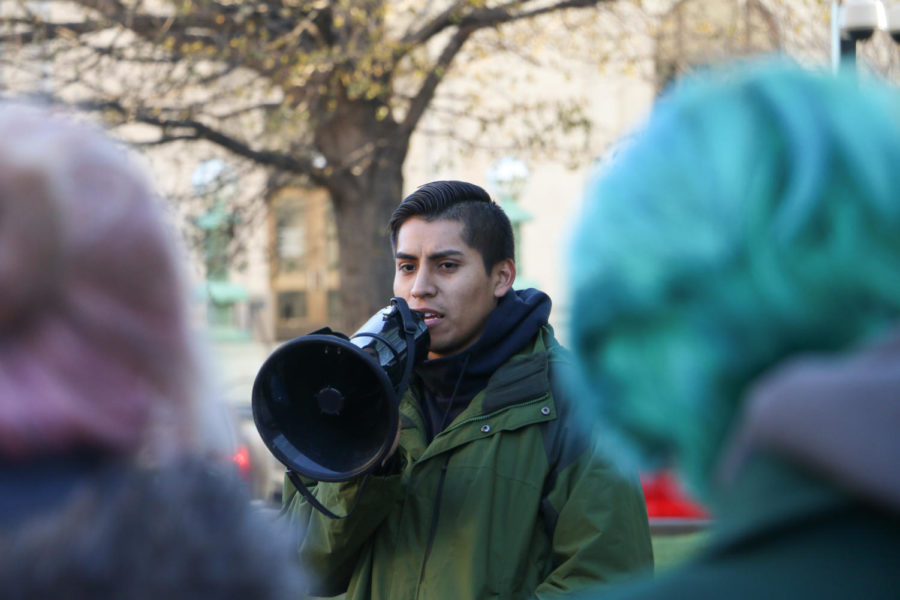DACA recipients and citizens rally in solidarity at Neal Smith Federal Building
Emily Blobaum/Iowa State Daily
Hugo Bolanos, graduate of Iowa State University, speaks at the Iowans Need Your Help: Rally To Support Dreamers and TPS Holders at the Neal Smith Federal Building in Des Moines on Dec. 1.
December 1, 2017
“This is where we get our fingerprints taken to get our papers,” Hugo Bolanos said.
Bolanos stood outside of the Neal Smith Federal Building in Des Moines on Friday morning with about 50 other protesters.
“For the longest time, I was scared to share my story and I was scared to fight for undocumented people on DACA, just because I solely thought that if I were to fight, they’d come and take me right then and there,” Bolanos said.
Bolanos, an Iowa State graduate and DACA recipient, attended and spoke at a rally in support of DACA and people on temporary protected status or “TPS.” Bolanos also helped plan the event.
The event was titled “Iowans Need Your Help: Rally To Support Dreamers and TPS Holders.”
“Congress has yet to act on a DREAM Act and they keep terminating the TPS protections for immigrants,” said Kenia, an organizer and DACA recipient who requested her last name not be included. “[Citizens] need to be lobbying every single day, getting people involved, because a lot of people don’t understand the severity of the issue. They need to be telling our stories, it doesn’t always have to come out of our mouth.”
Kenia urged people with the ability to be involved in the political process to be relentless in applying pressure to representatives. She directed those who want to be involved to contact the American Friends Service Committee and Iowa Citizens for Community Improvement, as well as advising them to make connections with activists.
Bolanos recommended those who wish to be involved to educate themselves on the issues before joining actions.
“An average of 122 DACA recipients across the nation lose their protected status every single day and that means that they can be deported and persecuted,” Kenia said.
The Neal Smith Federal Building was chosen as the site of the protest for a specific reason. Senators Chuck Grassley, R-IA and Joni Ernst, R-IA hold offices in the building, and protestors wanted them to hear their grievances and receive banners that read “pass a clean DREAM Act and extend TPS protection.”
“We need to be able to speak up, because we have that privilege [as citizens],” Carolina Ramos said. “Our undocumented family, brothers and sisters, they don’t.”
Ramos is the vice president of La Fuerza Latina at Drake University and said the group’s Instagram and Facebook often share information about similar actions and will continue to. Ramos, Bolanos and Kenia each said more protests will happen until the federal government passes a DREAM Act and extends protection for TPS recipients. Ramos said just making a phone call to representatives is not enough to be considered a real effort.
Protestors were initially denied entry to the building but following a deluge of calls to the offices, representatives of both Grassley and Ernst agreed to meet with protesters in the lobby of the Neal Smith Federal Building.
Those who gathered shared concerns about the Trump administration’s desire to deport DACA recipients and end TPS for immigrants from 10 countries that have been ravaged by conflict and disaster.
“At a certain point, intent behind policy ceases to matter,” said Isabelle Barrett, Drake University student. “It’s the impact… and the impact is racist and inhumane.”
Representatives for Grassley and Ernst said they would be willing to set up a conference call between protesters and the senators and referenced anecdotes about helping immigrants obtain visas.
Members of the crowd bristled at the anecdotes citing the inefficacy of helping one person at a time and demanded a “clean DREAM Act.”
The DREAM Act, which was initially introduced in 2001, has failed to pass each time it has been introduced, most recently in 2011. DREAM is an acronym for Development, Relief, and Education for Alien Minors.
DACA was introduced by the Obama administration as an executive order in 2012 in response to the DREAM Act failing to pass and applies to those who would have been eligible for the DREAM Act.
Passing a DREAM Act would essentially extend the benefits of DACA permanently for undocumented immigrants who entered the U.S. as minors.







